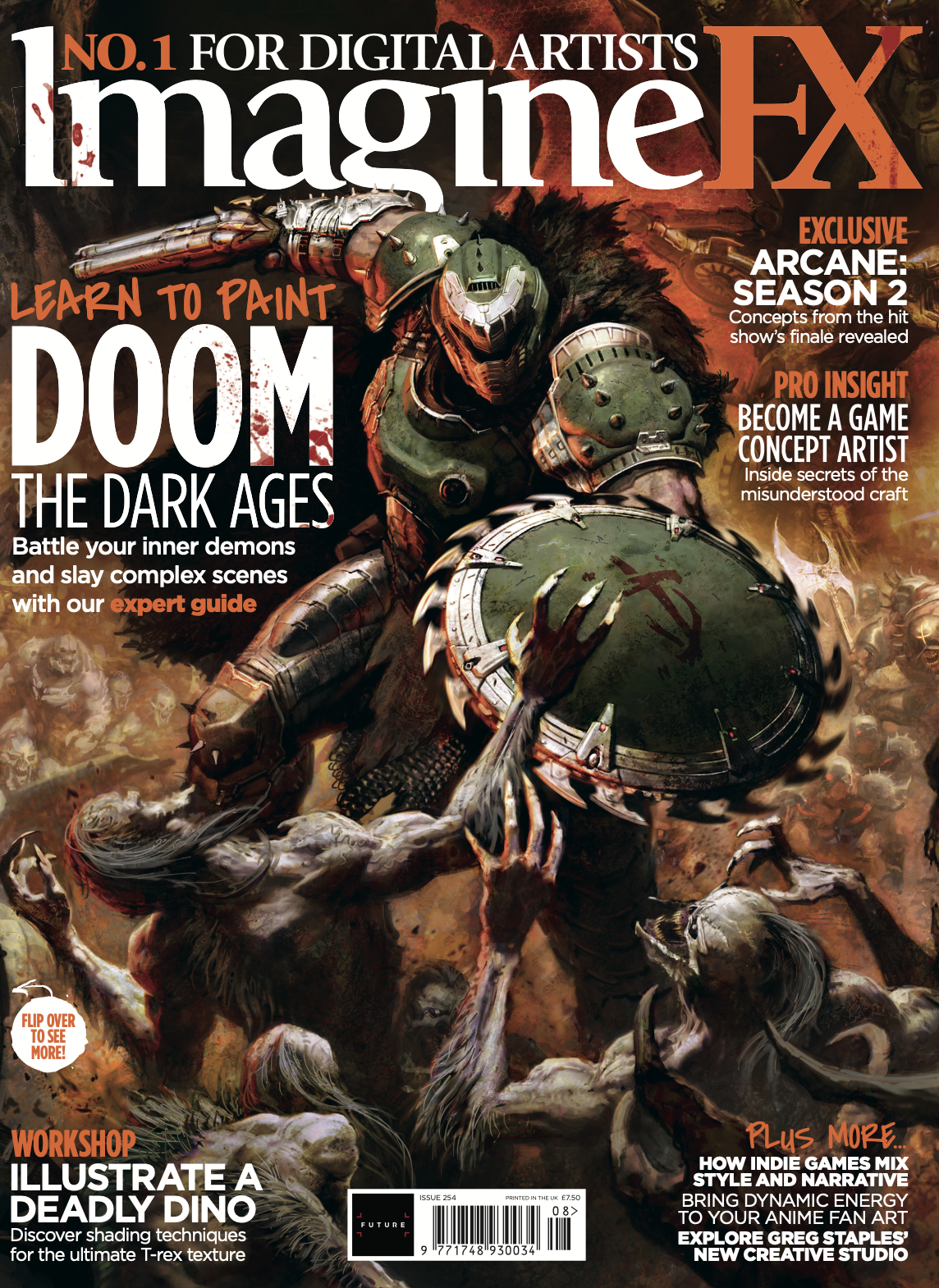Industry insight: Are design competitions spec work?
It seems that nothing gets artists more heated than a discussion about spec work. What is and what isn't acceptable has been a topic of conversation for years, and we've asked leading designers to weigh in with their opinions.
The rise of design competitions among the community are a growing concern, with many artists believing it's just a way for companies to source material for free. But is this really the case? Are design competitions spec work?
We spoke to artists and designers from all around the world to get their thoughts...
Paul Boag says

"I think the reason for the disagreement in this areas is because there are no black and white answers here.
Some design competitions are obviously nothing more than a thinly disguised request for spec work, while others are honest competitions.
"For me the difference is fairly clear. A competition shouldn't ask a professional to provide work that will then be used for commercial gain in return for a prize. That in my eyes is a commercial transaction and should be treated on that basis."
Paul is the founder of UK web design agency Headscape
Sarah Parmenter says

"I do think design competitions are spec work, nothing makes my blood boil more than seeing these occur at various points around the internet. To the designer, it's seen as an opportunity to have your work showcased, normally in an arena it wouldn't otherwise be seen in, the businesses responsible for this work know exactly what they are doing - it's crowd sourcing at its best, with little to no financial outlay.
"They get options even some London agencies couldn't surpass. Normally these are the worst clients to have as they don't have clear and defined brief, they are the "I know when I see it" type - and from experience, this only ever ends badly.
I used to share my office back in 2004, with a guy who would try and make a living from just submitting work to design competitions. He would slave away all day on various designs and, although, quite often would get picked, the prize money was pitiful at best - even if you won more than one competition every week, it still wouldn't generate significant income it seems."
Sarah is a web and UI designer and owner of design studio You Know Who
Jacob Cass says

"Design contests and places that offer them are not the future of graphic design, nor do I see a time when it ever will be.
"However, in the long-term I believe spec work is going to be detrimental to the design industry both devaluing design and designers as a whole, while making the world an uglier place. And with that said, my opinion is to not support spec work."
You can read more of Jacob's opinions on spec work on his website.
Jacob is a graphic, logo and web designer and founder of New York-based studio Just Creative
Steven Bonner says

"While I'm a massive hater of all things spec, I don't think (most) design competitions fall into that bracket unless that competition is for a particular brand, and a specific theme has been laid out.
"For example, if a t-shirt competition asks you to design around a particular logo or slogan, it's got a specific purpose. You can't use it for anything else if you don't win and you're not getting paid - that's spec in my book. If it's an open theme and you can do whatever you like, then why the hell not? If you don't win it's no problem, you still have a nice little piece that you can sell on later, make prints of, and do whatever you like with."
Steven Bonner is an internationally known illustrator, typographer and graphic designer.
Claudio Guglieri says

"I think that this is an issue that affects not only the artistic community at large, but other fields where it's equally hard to estimate the time, work and effort of a given project, outcome or result.
"It's an issue in which those who work in these fields find themselves having to go through an initial phase of building-up their recognition.
"In our case it's in the form of a portfolio, that will be used in the hope of landing future assignments and also to back-up any decision or apparent risk taken in front of a client.
"So, I would say yes. A design competition in which the company is going to use the awarded work as part of a promotional campaign should be considered spec work. There can only be one winner among probably hundreds of unrewarded submissions.
"With that said, I'm not entirely against the idea either. I think design competitions serve a greater purpose as well; so many people who are building their portfolios also get the opportunity to pitch their work to big companies through this forum. Though on the other hand it's also true what the NO!Spec (www.no-spec.com) community claims; that spec work hurts the industry by allowing companies to get away with not paying and not having to guarantee any type of compensation to designers working on a project.
"In any case nobody likes to work without getting paid. Whether young or old, all designers want to get paid and to be able to worry about everything else rather than that. I think Spec work is useful for the upcoming generations as it gives them an opportunity to develop their skills, pitch their work and to build their portfolio. But at the same time the brands out there should be more responsible and use spec-work only for specific purposes that don't devalue the work of established professional designers trying to make a living."
Claudio is a senior designer at global digital agency Fantasy Interactive
Jon Burgerman says

"I think design competitions are often a cynical ploy to get a lot of free work from hopeful young creatives and only reward one or two of them for their time and effort.
"But I understand why people enter the competitions - anything to get ahead seems like a worthwhile punt but clients take advantage of that."
Jon Burgerman is an English artist, illustrator and salad enthusiast.
Shane S.Mielke says

"Some feel that web competitions are preying upon people for free ideas & creativity which the definitely are. That said, I do think that these promotions are potentially perfect opportunities for students or people who might otherwise be unmotivated to make up personal projects to help fill up their portfolios.
"I see a lot of students coming out of art institutes who lack the desire and vision it takes to populate a portfolio with high quality personal projects or fake clients that would be good practice for them. Competitions are potentially good opportunities for people who need that carrot dangled in front of them to motivate them."
Shane is designer and creative director at digital creative agency 2Advanced Studios
Dan Moat says

"Design contests, especially where the contest holder is benefiting directly from the outcome (ie a massive company holding a contest to get their logo redesigned) are absolutely spec work! On the part of the contest holders, the sheer number of options they have for the same money as just working with one designer (or less in some cases) can be absolutely ridiculous.
"In order to enter you need to be able to afford to lose that time, and earning potential. If you got to a point where you're relying on things like contests to get any work at all I think you should know you're in trouble!
"Speculative projects can be great for a student trying to build up their portfolio or I suppose someone with enough money coming in they can afford to take a stab in the dark but for a professional entirely relying on income from real clients and briefs this kind of thing is a mine field that is probably best avoided. You really have to think of how you value your own time and skills before throwing it around for free.
"Most forms of design-on-the-cheap undervalue both the input and output of industry professionals and therefore potentially damage its integrity, but contests seem to be more easily welcomed by the community which is a tad self-depreciating. I can see why it is an enticing thing for companies to do, especially because there will inevitably no shortage of entrants, which is perhaps a shame. Every contest isn't necessarily pure evil by default, but million-dollar companies should know better."
Dan is a graphic designer and founder of design company Tahninial
Antony Ward says

"The way I see a competition is that you do something to try to win, and when you do you get a prize. Be this cash, an item or a contract you are aware that any time or effort you put into it before hand may result in nothing.
"Look at the Dominance War competitions. You put in lots of effort in the hopes you will win, and if not you at least have a nice portfolio piece.
"You could do the same, but for a contract instead, so there is little difference apart just the end result and the "prize".So, I guess I do see them as spec work in a way."
Antony Ward is a freelance digital artist, animator and writer.
Dan Mall says

"Spec work is any work done without the promise of pay; design competitions certainly fall under that banner. You know what else is spec work? Personal projects. Blog posts. Sales calls. Business lunches. All things that can be used to try and get work without assurances.
"The real issue seems to be that someone else -- usually a client or the organization hosting the design competition -- gets more value than they should be getting. But are they really? More often than not, the people generally responding to design competitions are ones without assurances of work: students, new freelancers, inexperienced designers.
"A company could host a competition and offer a $100 prize and get some great student and amateur submissions. Likely, very few great designers are going to respond because they're either too busy or it's not worth their time. Conversely, the same company could spend $10,000 hiring a great designer to design a logo for them (not to mention the time they've invested in the due diligence to find the right designer).
"These companies get what they pay for, and that's not a bad thing. A $100 prize garners $100 results. Hiring a designer for $10,000 gets you a process and a logo worth $10,000. Both are equally viable strategies.
"From the designer point of view, it's a business decision. Is the time you spent on this competition better spent elsewhere? Do the chances of you winning this competition feel pretty good? (Aside: I entered -- and won -- many design competitions when I was a starting out as a designer because I suspected not many people would enter. Take that for what you will.)
"It's the same risk as bidding for a job against another designer or agency, regardless of whether spec is involved. It's about the value you get in return for the amount of work you'll put forth. If winning that competition will get you worldwide acclaim, who cares whether the prize was an iPod Shuffle? Value isn't always monetary.
Dan is an award-winning designer who, in the past, worked for Happy Cog and Big Spaceship and is currently the founder and design director at SuperFriendly. He is also technical editor at A List Apart, and - via his love/obsession for typography - he is also the co-founder of Typedia and swfIR.
Rob Redman says

"I think it varies depending on your situation. If you're just starting out, it can be great to bulk out a reel or portfolio and if you get to share on Vimeo etc it'll help get your name out there.
"But if you're already established and people ask you to do it then NO! That's people trying to get a freebie from a well known artist or studio and it's bang out-of-order.
"On the other hand if there's a contest or competition that a freelancer (or even studio) wants to take part in then great. This can be a motivated way of trying out a new workflow or technique, or justifying a project that wouldn't get off the ground otherwise. I've also heard of studios sing this kind of thing to break in graduates and get them used to the daily workings of the company without risking them spoiling a live client project."
Rob is a 3D artist and designer. He is founder and director of Pariah Studios and also works as technical editor for 3D World Magazine
Gavin Strange says

"Ahhh creative competitions... I have a very strong opinion of these! I think they are like creating spec work and are quite often badly organised.
"I don't think it's right when a brand or an organisation wants something created but they can't be bothered to pay the going rate so think a competition will get them what they want for little or no money.
"In really extreme cases it's exploitation, yes "exposure" is a real credible reward but I can't pay my rent with it!
Gavin is a senior designer for the digital department of Aardman Animations by day and by night goes under the alias of JamFactory
Nicholas Patten says

"Sites like 99designs.com are perfect for companies/individuals looking for a great logo, website designs, etc for their set price. It generates more ideas and great quality of choice rather than just dealing with one designer.
"By having a site like 99designs.com it allows new designers to stay active and practice with actual content/instructions to go by. The negative to this is that there are thousands of designers working for free in hopes of winning design competitions.
"Spec work is something a lot of professional designers do not do, period. But for new designers this has created an avenue for them to get some practice and possible income. The design industry isn't as exclusive as it may have once been. Anyone can do it. Just depends on how much you value your time."
Nick is a video editor, graphic and web designer and product manager of DirectMarkets
So, that's what our designers think. But what are your thoughts on design competitions and spec work? Let us know in the comments box below...

Thank you for reading 5 articles this month* Join now for unlimited access
Enjoy your first month for just £1 / $1 / €1
*Read 5 free articles per month without a subscription

Join now for unlimited access
Try first month for just £1 / $1 / €1
Get the Creative Bloq Newsletter
Daily design news, reviews, how-tos and more, as picked by the editors.

The Creative Bloq team is made up of a group of art and design enthusiasts, and has changed and evolved since Creative Bloq began back in 2012. The current website team consists of eight full-time members of staff: Editor Georgia Coggan, Deputy Editor Rosie Hilder, Ecommerce Editor Beren Neale, Senior News Editor Daniel Piper, Editor, Digital Art and 3D Ian Dean, Tech Reviews Editor Erlingur Einarsson, Ecommerce Writer Beth Nicholls and Staff Writer Natalie Fear, as well as a roster of freelancers from around the world. The ImagineFX magazine team also pitch in, ensuring that content from leading digital art publication ImagineFX is represented on Creative Bloq.
